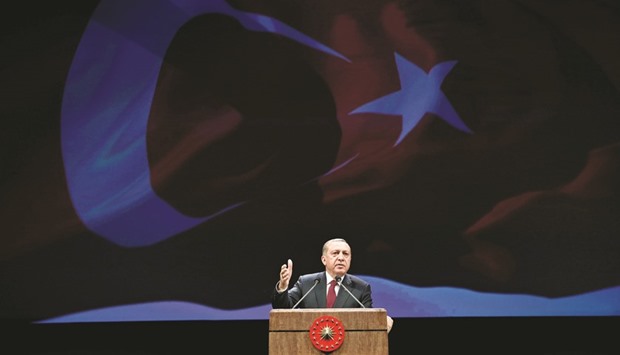Turkey dismissed more than 15,000 state employees, from soldiers and police officers to tax inspectors and midwives, yesterday and has ordered the closure of 375 associations within the state of emergency imposed after the July failed coup.
More than 100,000 have already been suspended or sacked so far in a crackdown on those alleged to have links to coup-plotters while dozens of media outlets have been shut down.
In the latest government decree published yesterday, 7,586 personnel working in the police, including police chiefs and commissioners, were dismissed.
Meanwhile, 1,956 soldiers and personnel in the air force and navy were sacked while another 403 were removed from the gendarmerie, which looks after domestic security.
Thousands more were dismissed in government ministries and state institutions, including nearly 3,000 officials in the interior ministry and related institutions.
In total, 15,726 people have been dismissed under the latest decrees.
The dismissals are permitted under the state of emergency, which was extended by three months in October, and was originally imposed in the wake of the coup.
The dismissals announced in the Official Gazette gave no reasons beyond “membership of, or links to, terrorist organisations or groups deemed to be acting against national security interests”.
Some of the accused have been targeted for having accounts with a bank once controlled by Gulen’s followers, being members of an opposition union, or using a smartphone messaging app seen by the authorities as a Gulenist communications tool, according to Turkish media reports.
The decrees also ordered the closure of 375 associations across the country working on issues ranging from rights to culture to women.
Critics have claimed that the crackdown goes well beyond the suspected coup plotters.
Amnesty said the groups closed included lawyers associations working on preventing torture, women’s rights groups working against domestic violence and local NGOs helping refugees.
Among those ordered closed is the leading Ankara-based children’s rights NGO Gundem Cocuk (The Agenda is Children).
The decrees also ordered the closure of nine provincial press outlets and 19 health institutions.
Ankara blames Gulen and his network, which it refers to as the “Gulenist Terror Organisation” (FETO), for the events of July 15, in which more than 240 people were killed as rogue soldiers commandeered tanks, fighter jets and helicopters, bombing parliament and other key buildings.
Gulen, who has lived in self-imposed exile in Pennsylvania in the United States since 1999, denies involvement.
“There is no place in this ... land drenched with the blood of martyrs for those who sold their souls to Pennsylvania, the separatist terrorist organisation, or any other illegal organisation,” Turkish President Recep Tayyip Erdogan said.
He frequently uses “Pennsylvania” as shorthand for the cleric’s network.
The “separatist organisation” is a reference to the Kurdish PKK group, which has waged a three-decade insurgency for Kurdish autonomy in Turkey’s southeast.
Erdogan indicated in a speech yesterday that the purges would continue, saying that not all Gulen supporters had been rooted out of Turkish institutions.
“We know that the state has not been entirely cleared of this treacherous network. They are still in our armed forces, our police organisations, inside our judiciary, inside different state institutions,” he said. “We will not leave our country to them, we will not let them consume this nation. We will do whatever is necessary.”
In a separate development, Turkish authorities detained 20 staff at Silivri jail outside Istanbul accused of using the Bylock messaging app that Ankara says was specially developed by Gulen supporters for the coup plot.
Those detained include the head of the prison, named as HT, it added.
Hundreds of suspects rounded up after the coup are being held in the jail.

Erdogan: We know that the state has not been entirely cleared of this treacherous network. They are still in our armed forces, our police organisations, inside our judiciary, inside different state institutions. We will not leave our country to them, we will not let them consume this nation. We will do whatever is necessary.
